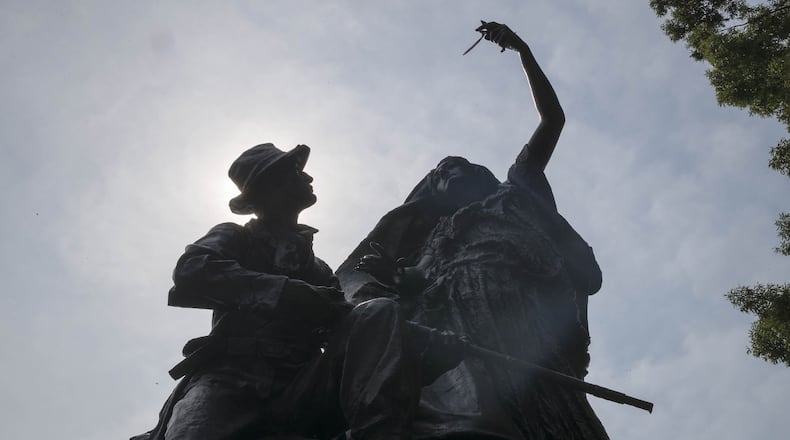A city plan to put contextual markers citing slavery as a cause of the Civil War next to four of Atlanta’s Confederate statues this spring has hit a snag.
The proposed markers are part of a larger city initiative to address the presence of controversial Confederate-named streets and monuments in Atlanta. A City Council committee charged with implementing the overall plan, which includes the markers, projected in January that they would be installed by late spring.
During a committee meeting on Wednesday, however, members said it would take at least until the end of the year to get them in place. The reasons for the delay: Deciding who will pay for the signs and the process of getting the proposal vetted and approved by other city departments before it’s voted on by the full council.
"I wanted to have this done by now," said Council Member Carla Smith, who heads the three-member street names and monuments committee.
The monuments in question are the Confederate Obelisk and Lion of Atlanta in Oakland Cemetery; the Peace Monument in Piedmont Park; and the monument at the intersection of Peachtree Battle and Peachtree Roads commemorating the Battle of Peachtree Creek and North-South reconciliation.
Though the city technically owns them now and maintains them, none were originally erected by the city. In the aftermath of the Civil War, organizations sympathetic to the Confederacy paid for them and had them installed. Now the city is working with the Historic Oakland Cemetery Foundation, the Piedmont Park Conservancy and the Atlanta History Center to figure out how to pay for the new signs that will augment them.
Representatives from the cemetery, conservancy and history center attended Wednesday’s meeting.
Smith said a donor has agreed to pay for the markers, at a cost of $2,000 each. The donor would then donate them to the city. Meeting participants debated whether the cemetery foundation and the park conservancy might pay for signs for their venues instead and assume maintenance of them once installed.
Council Member Michael Julian Bond and Doug Young, Atlanta’s assistant director for historic preservation, said the city should take responsibility for both. Bond said that if the donation did not come through, it would be possible to get it allocated through the city’s general fund.
"I think the city should completely own this, embrace it," Bond said.
Several city departments, including legal and parks and recreation, also will review the plans before they are brought to a council vote.
All agreed that it wasn’t a question of whether the markers should be erected, but how quickly the wheels of city government could move to make it happen.
“The conservancy agrees the panels are needed,” said, Mark Banta, chief executive of the conservancy.
The proposed language for the markers varies with location, but all refer to the practice of racial segregation laws instituted after the Civil War that disenfranchised generations of African Americans.
About the Author
Keep Reading
The Latest
Featured




